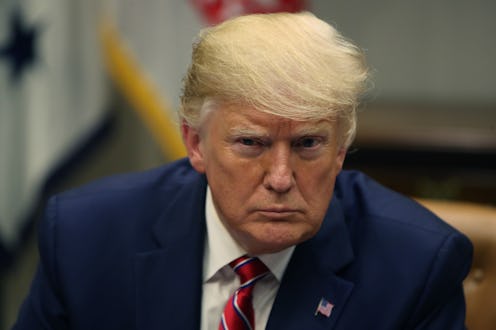News
Trump Said He'll Take Dirt On 2020 Candidates From Foreign Spies, But Is That Legal?

President Donald Trump shocked observers on Wednesday when he told ABC's George Stephanopoulos that he would listen to information on a campaign opponent that was offered by a foreign government without calling the FBI. This, of course, was surprising because all of the investigations that came out of his campaign doing exactly that when a Russian government-connected lawyer offered information on Hillary Clinton during the 2016 campaign. Still, though, no one from the Trump campaign has actually been convicted of a crime for that action — so is taking foreign campaign information a crime, even?
According to FBI director Christopher Wray, a foreign offer of campaign research is at least "something that the FBI would want to know about," as he said during testimony before Congress, per The New York Times. Wray referred to offers of information from a foreign government as that government potentially "influencing or interfering with our election." In his special counsel report, then, Robert Mueller backed up previous conclusions that Russia did interfere in the 2016 presidential election to get Trump elected, saying that it happened "in sweeping and systematic fashion."
Importantly, however, Mueller's team did not indict anyone from Trump's campaign for accepting the offer of foreign campaign information, according to The Washington Post — but the question of its legality is still a murky one.
It's certainly illegal to accept foreign campaign contributions, according to Federal Election Commission (FEC) regulations. The FEC defines a contribution as "a gift, subscription, loan, advance or deposit of money or anything of value given to influence a federal election." The question, therefore, is whether information is "anything of value."
Opposition research, which, as The New York Times explained, is a normal part of any political campaign, is certainly an important piece of any candidate's arsenal, and it could carry "value" in that it can require many hours of work in order to find anything useful.
University of Louisville Political Science department chair Jasmine Farrier, PhD, tells Bustle there's an additional reason why an offer of information from a foreign government is, as she says, "unlikely to be 'free' of cost."
"The person, government, or agency providing the information will inevitably want something in return — possibly swaying overt or covert future public policy decisions in the U.S.," Farrier says. "Also, the campaign information may be used to sway voters, and, possibly, turn the tide of a close election."
But The Washington Post explained, Mueller might not have been certain that the courts would find that freely offered foreign opposition research actually fell into the territory of "anything of value given to influence a federal election."
Democrats in Congress have repeatedly moved to more explicitly define foreign election interference as a crime, as Mother Jones wrote, but Republicans — with Senate Majority Leader Mitch McConnell at the helm — have pointedly refused to bring any of the proposed legislation up for a vote. For now, then, the FEC regulations stand alone in preventing campaigns from accepting campaign contributions of "value" from foreign nationals or governments — but as the Trump case illustrates, it is difficult to prosecute instances of this as actual crimes.
Trump, for his part, doesn't seem to see anything wrong with accepting offers of foreign information. In fact his interview with Stephanopoulos seemed to indicate that he would do it in 2020, if the opportunity arose.